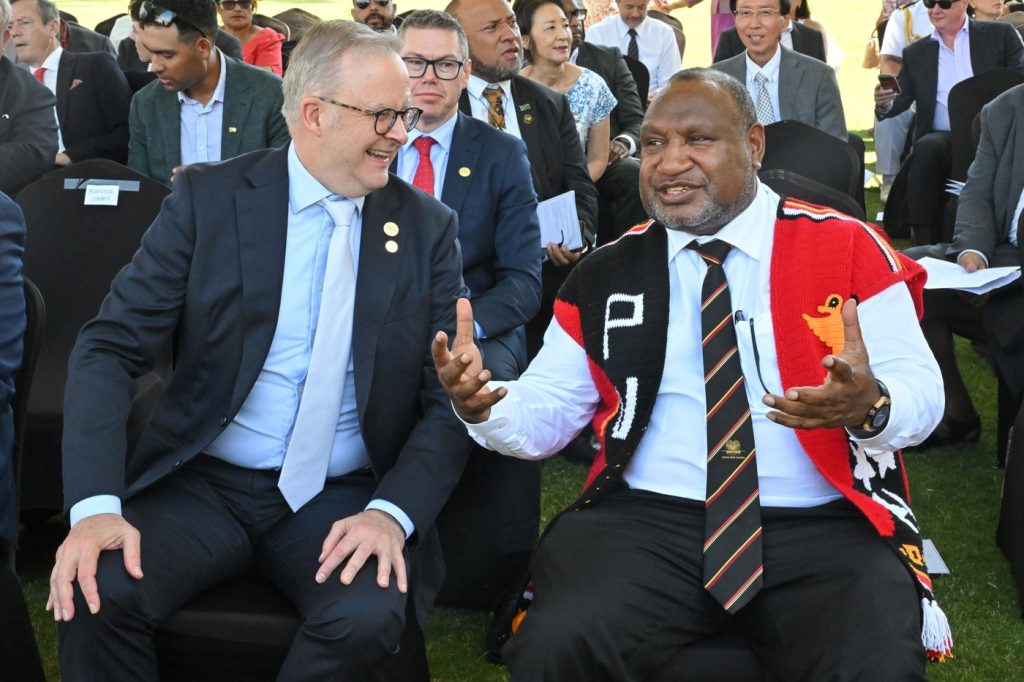MELBOURNE, Australia (AP) – Papua New Guinea's Cabinet has formally approved a bilateral defense treaty with Australia, setting the stage for the leaders of both nations to sign a significant agreement aimed at mitigating Chinese influence in the Pacific region. Prime Minister James Marape confirmed the treaty's approval on Thursday, highlighting the importance of the relationship between Papua New Guinea and Australia.
Marape stated, "Australia has only one other mutual defense treaty of this type and at our request Papua New Guinea will now sign this treaty." The other alliance-status pact Australia has is the ANZUS Treaty, which was signed in 1951 with the United States and New Zealand. He emphasized the depth of trust and shared future between the two nations.
Australian Prime Minister Anthony Albanese expressed eagerness to sign the treaty alongside Marape, stating that it would formalize their nations’ close friendship and partnership. The new treaty reflects a significant shift in military collaboration between the two nations, especially considering Papua New Guinea's strategic location and importance in countering China's rising influence in the Pacific.
Historically, Australia served as Papua New Guinea's colonial master until the latter gained independence in 1975. With a population of approximately 28 million, Australia is the largest nation in the South Pacific, while Papua New Guinea has an estimated population of around 10 million.
In recent years, both the United States and Australia have been strengthening military ties with Papua New Guinea amidst concerns over China's expanding presence in the region. The new defense treaty promises to enhance military integration, facilitating cooperation in areas such as sharing military equipment and personnel.
Marape and Albanese initially aimed to finalize the treaty during a ceremony in Port Moresby on September 17; however, a critical Cabinet meeting meant to endorse the agreement did not occur as planned. Instead, the two leaders issued a joint statement affirming the treaty's central principles. This treaty will stipulate that "an armed attack on Australia or Papua New Guinea would be a danger to the peace and security of both countries."
Notably, for the first time, Papua New Guinean citizens would have the opportunity to serve in the Australian Defense Force, potentially addressing Australia's ongoing recruitment challenges. Service in the Australian military could also serve as a pathway for these individuals to gain Australian citizenship.
China's embassy in Port Moresby expressed discontent with the announcement, criticizing the nature of the bilateral treaty. They stated that such agreements should not limit a sovereign country's ability to engage with third parties and cautioned against targeting any third nation or undermining legitimate interests.
This development represents a balancing act for Papua New Guinea, which is also striving for enhanced economic ties with China. Oliver Nobetau, project director at the Lowy Institute, commented on the dual strategy employed by the Papua New Guinea government, distinguishing between defense relations with Australia and economic partnerships with China.
Since 2022, Australia has intensified efforts to improve relations with Pacific island nations, particularly after China secured a controversial security deal with the Solomon Islands, raising worries about the potential establishment of a Chinese naval base in the South Pacific. Following China's growing influence, three Pacific island nations have switched their allegiances from Taiwan to Beijing since 2019.
Concerns about China's expanding footprint in the Pacific extend to its engagements with countries such as Fiji, Kiribati, Samoa, Solomon Islands, and Vanuatu, making the new treaty between Australia and Papua New Guinea a pivotal development in the region's geopolitical landscape.











